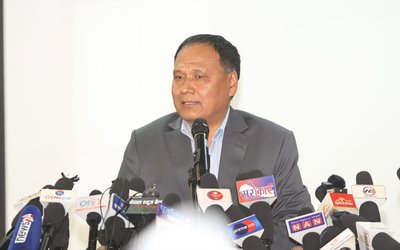
Although prime minister Pushpa Kamal Dahal expanded his cabinet, including 15 members from Nepali Congress, the sense of stability is yet to come. In a number game, Prime Minister Dahal needs to woo even small political parties to maintain the majority.
As former prime minister and leader of CPN UML K.P.Sharma Oli is wooing the disgruntled factions, Prime Minister Dahal does not want to lose any political parties which voted him.
This expansion is the fourth in a row as he has already expanded his cabinet thrice. First, along with two ministers from his party, he took the oath office. Second, he inducted three new members, two of RPP and one of Communist Party of Nepal United and then he inducted eight ministers representing his party.
Despite so many complexities and difficulties, Nepali Congress leader and former prime minister Sher Bahadur Deuba bowed down to a faction within his own party choosing the candidate on the basis of factions. In the expansion of the cabinet, there was so much of bargaining and compromise.
Prachanda’s Challenges
As expansion of cabinet has almost completed following the inclusion of Nepali Congress, Prime Minister Prachanda’s big challenges is now to implement the 3-point agreements signed with Samyukta Loktantrick Madheshi Morcha (SLMM).
With the implementation of the demands, including compensation for the injured, declaration of those who died in the protests as martyrs, and withdrawing pending criminal cases against other agitators, the government is now working to table the constitution amendment bill in the Legislature Parliament, accommodating the demands of Madheshi front.
SLMM is demanding the amendment of at least half a dozen of articles in the present constitution. The articles include boundary of provinces, citizenship and authority of provincial government, which are very sensitive.
The seven-point proposal includes right to participate in state structures on the basis of principles of proportional inclusion, delineation of electoral constituencies based on population, allowing naturalized citizens to hold highest offices both at the federal and the provincial level, incorporation of five disputed districts Kanchanpur, Kailali, Sunsari, Jhapa and Morang in the adjoining Madhes province(s), representation in the national assembly based on population, automatic citizenship to foreign women married to Nepali citizens and delineation of electoral constituencies every 10 years.
During the recent visit to India by Deputy Prime minister Bimlendra Nidhi, Indian political leaders suggested the current government should resolve the ongoing unrest in Terai/Madhes region by addressing the demands of Madhesi front.
However, it is easier said than done. As main opposition CPN-UML leader K.P. Sharma Oli has made it clear that his party will not support the amendment bill without valid reasons, this indicates that the bill will not get the much-needed two thirds of vote for amendment.
“Amendment of the constitution is not necessary now. If we amend the constitution on 'hey and say' basis, it will lose its essence,” said former Prime Minister Oli before leaving for his regular medical checkup in Bangkok.
This government’s utility will no more be there in case of failing to table the constitution amendment bill and addressing all the concerns of the Madheshi. “We are waiting to see new constitution amendment in the parliament as per the agreement,” said co-chair of Sadbhavana Party Laxman Lal Karn. “We voted the government, it is the turn of the government to look into our demand," said Karn.
With the agreement to share power nine months each, CPN-Maoist Center and Nepali Congress formed the government. Prime Minister Prachanda has already spent one month in the power. Amending the constitution, holding the elections for local bodies and tabling many bills for amendment, Prachanda led government has a number of urgent works.
Along with this, accelerating the post earthquake reconstruction work is another challenge. Whether it is for the amendment of the constitution, holding elections and carrying out post disaster program, the government needs broader consensus and support.
With a hostile opposition, half-hearted support of judiciary and growing internal disputes within coalition partners, Prachanda is heading to fulfill difficult mission.

Keshab Poudel
Poudel is the editor of New Spotlight Magazine.
- FM Dr. Deuba’s India Visit: Mission Aborted
- Mar 26, 2025
- AMBASSADOR MAEDA TORU: Warm Regards
- Mar 24, 2025
- PRO-MONARCHY MOVEMENT: Rising Dissatisfaction
- Mar 23, 2025
- Dr. PRABIN MANANDHAR: Person With Humility
- Mar 16, 2025
- US SUSPESION OF GRANT: Impact On Nepal
- Mar 10, 2025















